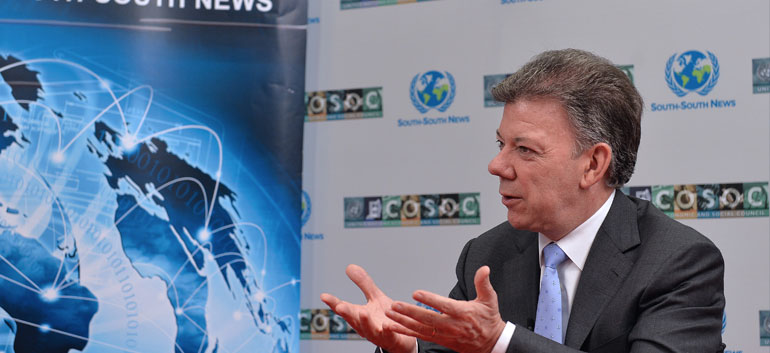President Juan Manuel Santos on Wednesday discarded postponing Colombia’s 2014 elections in order to give more time to peace talks with the country’s largest rebel group, the FARC.
The president said from Switzerland that if the “political will” exists, the negotiators of the FARC and government will be able to reach a final peace agreement before the end of the year, a deadline given by the head of state at the beginning of talks in November last year.
The FARC had proposed to postpone the elections to prevent electoral interests from interfering with the talks that seek to end Colombia’s almost 50-year-old armed conflict between the leftist rebels and the state.
“Let us open a national debate on the urgency and the desirability of postponing the electoral timetable by a year,” Marquez told press Monday at the beginning of a second cycle of talks that is supposed to tackle the guerrillas’ political participation.
MORE: Colombia’s peace talks take on FARC’s political participation
But according to Santos — who proposed to postpone elections earlier this year, but was forced to withdraw the idea after fierce criticism — he will not allow changing Colombia’s electoral dates because that would mostly benefit himself.
“I would never change a law for my own benefit, this is a principle for me, because postponing elections would extend my mandate and I would benefit from this change. This matter is entirely out of the question,” said the head of state.
Additionally, Santos claimed there was no need to postpone the elections as long as there was the political will to round up peace talks before the end of the year.
“I keep saying that we can reach a deal before the end of the year. It is possible,” said the president.
Santos and members of his cabinet have given the negotiators until the end of the year, three months before congressional elections are held, to come to an agreement. Presidential elections are set for May.
If successful, the peace talks will end the conflict between the FARC and the State that has been fought since 1964. However, it would not mean the absolute end to the armed conflict as the country’s second largest rebel group, the ELN, has not yet begun formal peace talks. Additionally, groups formed from the demobilized paramilitary umbrella organization AUC continue to commit acts of political violence.


